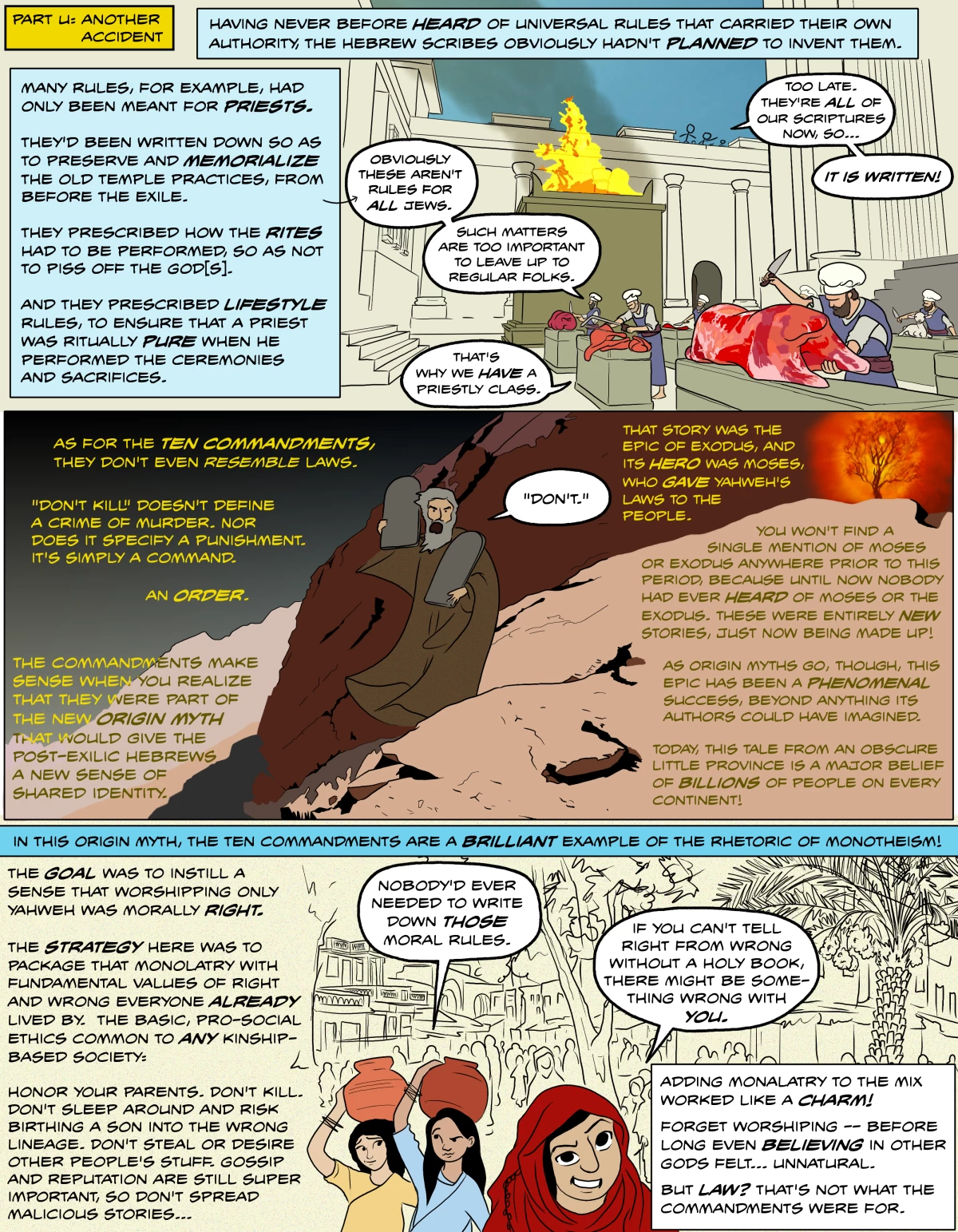
.
I’m starting to wonder if anything important has ever happened on purpose.
Constitutional Law
Part 2: “What Were They Thinking?”
Digression: “A History of Government in 6 Revolutions: From the Paleolithic to Philadelphia”
127. Inventing God and Law: Another Accident
TITLE: Part U: Another Accident
Panel 1: The inner courtyard of the Second Temple. As people look on from atop the walls, flames blaze on the gigantic open-air horned altar. Below, an army of priests in their priestly attire butcher cows, lambs, goats, and other animals at an array of smaller altars. The entrance to the courtyard is to the left, while the temple building itself is to the right.
NARRATION:
Having never before heard of universal rules that carried their own authority, the Hebrew scribes obviously hadn’t planned to invent them.
Many rules, for example, had only been meant for priests.
They’d been written down so as to preserve and memorialize the Old Temple practices, from before the exile.
They prescribed how the rites had to be performed, so as not to piss off the god[s].
And they prescribed lifestyle rules, to ensure that a priest was ritually pure when he performed the ceremonies and sacrifices.
PRIEST 1:
Obviously these aren’t rules for all Jews.
Such matters are too important to leave up to regular folks.
PRIEST 2:
That’s why we have a priestly class.
ONLOOKERS:
Too late. They’re all of our scriptures now, so…
IT IS WRITTEN!
-=-
Panel 2: Moses stands on the side of Mount Sinai, with a burning bush in the distance.
NARRATION:
As for the Ten Commandments, they don’t even resemble laws.
“Don’t kill” doesn’t define a crime of murder. Nor does it specify a punishment. It’s simply a command.
An order.
MOSES:
“Don’t.”
NARRATION:
The commandments make sense when you realize that they were part of the new origin myth that would give the post-exilic Hebrews a new sense of shared identity.
That story was the epic of Exodus, and it’s hero was Moses, who gave Yahweh’s laws to the people.
You won’t find a single mention of Moses or the exodus anywhere prior to this period, because until now nobody had ever heard of Moses or the exodus. These were entirely new stories, just now being made up!
As origin myths go, though, this epic has been a phenomenal success, beyond anything its authors could have imagined.
Today, this tale from an obscure little province is a major belief of billions of people on every continent!
-=-
Panel 3: A bustling Jerusalem street scene, with lots of people going about their business among streets and buildings and trees and plazas. In the foreground, two teenage girls carry clay jugs on their bare heads, while a young woman in a red headdress gives the reader a grin of amused reproach.
NARRATION:
In this origin myth, the Ten Commandments are a brilliant example of the rhetoric of monotheism!
The goal was to instill a sense that worshipping only Yahweh was morally right.
The strategy here was to package that monolatry with fundamental values of right and wrong that everyone already lived by. The basic, pro-social ethics common to any kinship-based society:
Honor your parents. Don’t kill. Don’t sleep around and risk birthing a son into the wrong lineage. Don’t steal or desire other people’s stuff. Gossip and reputation are still super important, so don’t spread malicious stories…
WATER GIRL:
Nobody’s ever needed to write down those moral rules.
RED GIRL:
If you can’t tell right from wrong without a holy book, there might be something wrong with you.
NARRATION:
Adding monolatry to the mix worked like a charm!
Forget worshiping—before long, even believing in other gods felt… unnatural.
But law? That’s not what the commandments were for.
-=-
FOOTNOTE:
I’m starting to wonder if anything important has ever happened on purpose.

